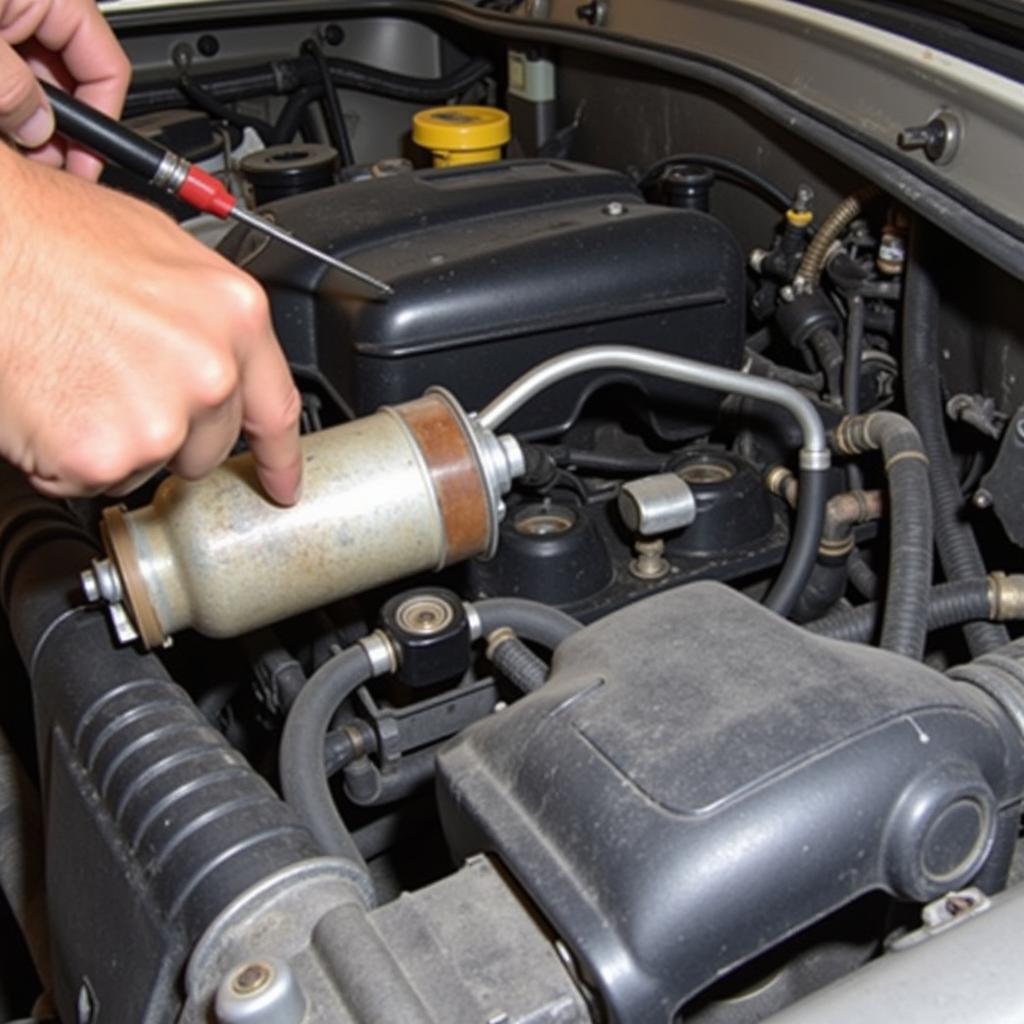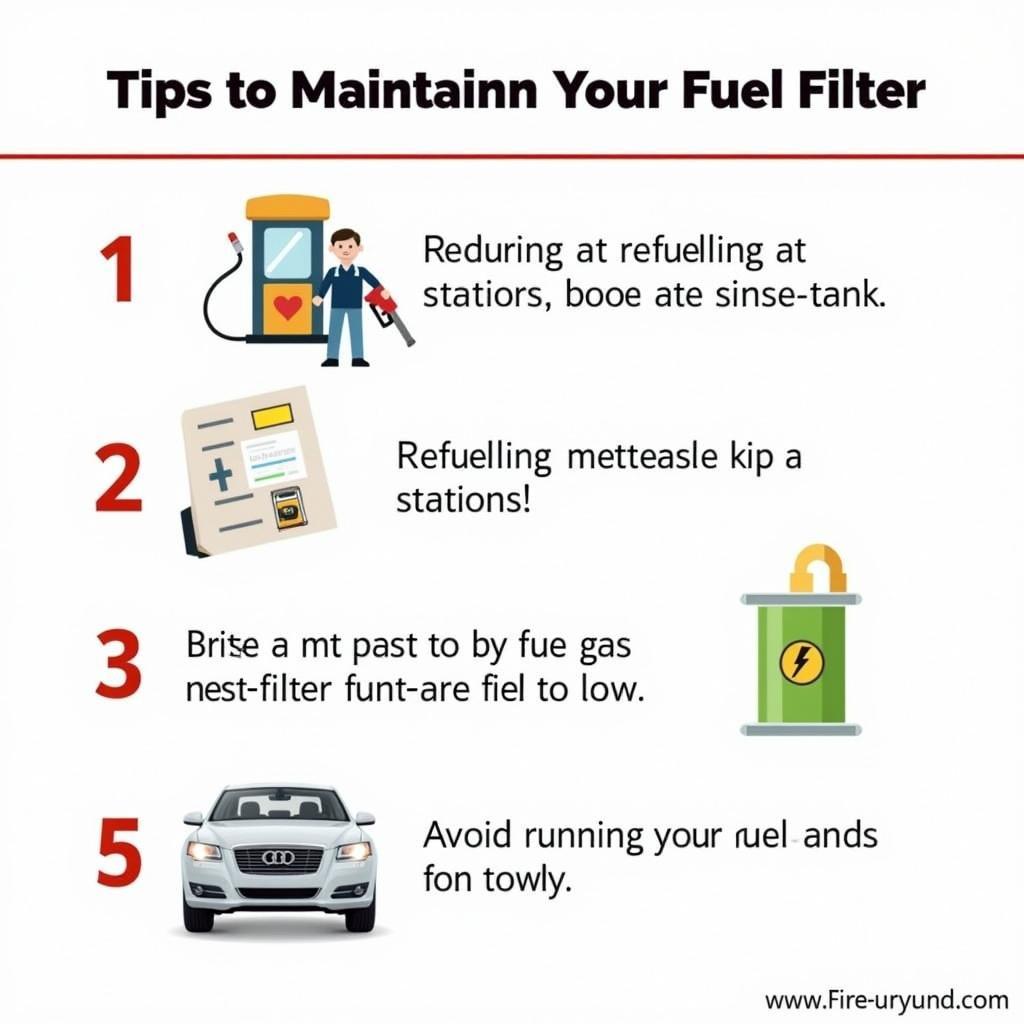Do All Cars Have Serviceable Fuel Filters?
Do all cars have serviceable fuel filters? The answer isn’t a simple yes or no. While all cars do have a fuel filter, the ease of servicing them varies greatly. Some are easily accessible and designed for regular replacement, while others are integrated into the fuel pump assembly and considered a non-serviceable part. Understanding this difference is crucial for proper car maintenance and can save you from potential headaches down the road.
Understanding the Role of Fuel Filters
Fuel filters are a critical component of any vehicle’s fuel system. They protect the engine by removing contaminants like dirt, rust, and debris from the fuel before it reaches the injectors or carburetor. This prevents these particles from clogging the fuel system and causing damage to sensitive engine components. Clean fuel ensures efficient combustion and optimal engine performance.
Serviceable vs. Non-Serviceable Fuel Filters: What’s the Difference?
The primary difference lies in accessibility and design. A serviceable fuel filter is typically located along the fuel line and is designed for easy removal and replacement. These filters are usually housed in a canister and are secured with clamps or fittings. Non-serviceable fuel filters, on the other hand, are often integrated within the fuel pump module, usually inside the fuel tank. Accessing these filters requires removing the fuel pump, a more complex and time-consuming process.
 Replacing a Serviceable Fuel Filter
Replacing a Serviceable Fuel Filter
How to Identify Your Fuel Filter Type
Identifying whether your car has a serviceable fuel filter can be done in a few ways. Consulting your owner’s manual is the most reliable method. It should specify the type of fuel filter your car has and the recommended replacement interval. You can also search online forums or contact your car’s manufacturer directly. Visually inspecting the fuel lines near the engine compartment can sometimes reveal a serviceable filter, but be cautious and consult a professional if you’re unsure.
Why Regular Fuel Filter Replacement is Important
Regardless of the type of fuel filter your car has, maintaining a clean fuel system is vital for optimal performance and longevity. A clogged fuel filter can lead to a variety of issues, including reduced fuel efficiency, engine misfires, difficulty starting, and even complete engine failure in severe cases.
Signs of a Clogged Fuel Filter
Recognizing the signs of a clogged fuel filter can save you from costly repairs. Common symptoms include:
- Difficulty starting the engine
- Rough idling
- Hesitation or sputtering during acceleration
- Reduced fuel economy
- Engine stalling
“A neglected fuel filter is a ticking time bomb for your engine,” says John Miller, a senior automotive technician with over 25 years of experience. “Regular maintenance, including fuel filter replacement, is crucial for preventing major engine problems.”
The Cost of Replacing a Fuel Filter
The cost of replacing a serviceable fuel filter is relatively inexpensive, typically ranging from $20 to $50 for the part itself. Labor costs can vary depending on the complexity of the replacement process. Replacing a non-serviceable fuel filter, however, involves replacing the entire fuel pump module, significantly increasing the cost. This can range from a few hundred dollars to over a thousand, depending on the make and model of your vehicle.
Extending the Life of Your Fuel Filter
While regular replacement is crucial, you can take steps to extend the life of your fuel filter. Always refuel at reputable gas stations to minimize the risk of contaminated fuel. Avoid running your fuel tank too low, as this can stir up sediment and debris in the tank, which can then clog the filter.
 Maintaining Your Fuel Filter
Maintaining Your Fuel Filter
“Investing in quality fuel and following recommended maintenance schedules can significantly extend the life of your fuel filter and protect your engine,” advises Sarah Chen, a certified automotive engineer with over a decade of experience in fuel system technology.
Conclusion
Do all cars have serviceable fuel filters? Not all. While every car has a fuel filter, some are integrated into the fuel pump and are not easily accessible for replacement. Understanding the type of fuel filter in your car and following the recommended maintenance schedule is crucial for ensuring optimal engine performance and preventing costly repairs. Remember, a clean fuel filter is essential for a healthy engine.
FAQ
- How often should I replace my fuel filter? Consult your owner’s manual for the recommended replacement interval.
- Can I replace the fuel filter myself? If your car has a serviceable filter, replacement can be a DIY project, but consult your owner’s manual or a professional if you are unsure.
- What happens if I don’t replace my fuel filter? A clogged fuel filter can lead to various performance issues and even engine damage.
- How do I know if my fuel filter is clogged? Look for symptoms like difficulty starting, rough idling, and reduced fuel economy.
- Are all fuel filters the same? No, fuel filters vary in size and design depending on the make and model of the vehicle.
- Can a bad fuel filter cause my check engine light to come on? Yes, a clogged fuel filter can trigger the check engine light.
- Where is the fuel filter located? Serviceable filters are typically located along the fuel line, while non-serviceable filters are integrated into the fuel pump module.
Need more help? Check out our other articles on car maintenance and repair. For personalized assistance, contact us via WhatsApp: +1(641)206-8880, Email: [email protected] or visit us at 456 Oak Avenue, Miami, FL 33101, USA. Our 24/7 customer support team is ready to help.
